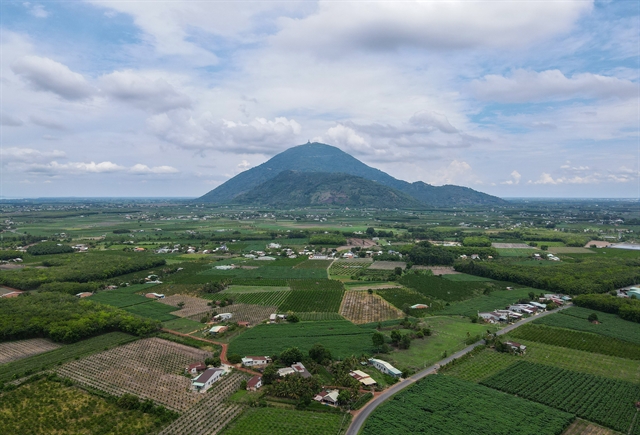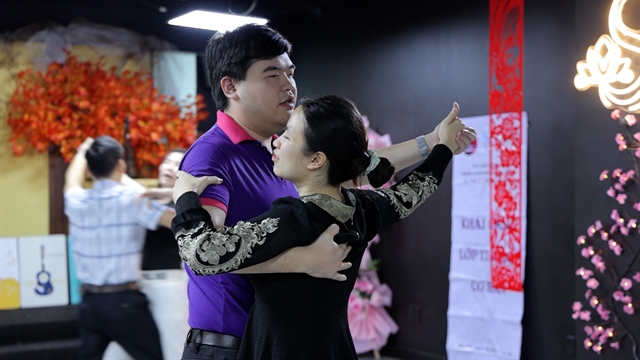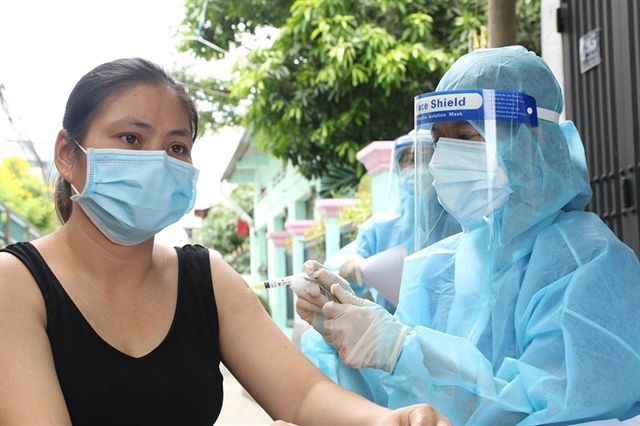 Society
Society

Issuing COVID-19 green cards to eligible residents is one of several strategies that the HCM City Department of Health has proposed after September 15, when the city will make a decision on relaxing social distancing regulations.

|
| A pregnant woman receives a COVID-19 vaccine. Photo courtesy of vietnamnet.vn |
HCM CITY — Issuing COVID-19 green cards to eligible residents is one of seven strategies that the HCM City Department of Health has proposed after September 15, when the city will make a decision on relaxing social distancing regulations.
Director of the HCM City Department of Health Tăng Chí Thượng is seeking feedback from the city People’s Committee on COVID-19 prevention strategies to be carried out after September 15.
During the outbreak, authorities have implemented multiple solutions such as the three-level treatment regime, treatment of infected cases at home, drug packages for patients at home, new drugs for treatment, and increased vaccine coverage throughout the city.
As a result, HCM City is expected to experience a drop in the number of severe cases and deaths after September 15. The fourth wave is expected to be moderately controlled in the time to come.
Seven key strategies proposed by the city Department of Health will be deployed after September 15, including vaccine coverage.
Vaccination
The city aims to fully vaccinate (two doses) all people 18 years old and over, with priority given to frontline forces and people at high risk of infection such as ones with underlying conditions, people over 50 years old, and pregnant women.
Children with underlying diseases or who are obese will be vaccinated when more vaccine shots are available.
"Green card"
Social distancing will be associated with a COVID-19 "green card". The city will gradually ease current isolation measures based on risk assessment, epidemiological surveillance data, and the response capacity of the health sector.
The aim is to restore production and provide essential services and circulation of the traffic of goods.
Classification of industries and units according to certain criteria will be carried out in order to gradually restore their operations.
Locals with the COVID-19 "green card" will be allowed to participate in some production and social activities, depending on the level of epidemic control.
Raising public awareness
The city will also raise locals’ awareness about COVID-19 prevention, vaccines, how to self-test when having suspected symptoms, how to administer self-care if infected, and how to contact medical staff during emergencies.
Locals are encouraged to pay attention to physical and mental health, and learn about the importance of nutrition and non-drug measures in combination with traditional medicines.
Community-based care
As for community-based care and management of infected cases, the Steering Committees for Epidemic Prevention and Control in wards and communes are in charge of managing the lists of cases isolating at home and ensuring that all patients are cared for and given the appropriate medicine packages.
Patients will be taken care of remotely by medical teams. However, home medical examination and treatment will be carried out for patients at high risk or with suspected symptoms. Timely detection of patients with signs of severe illness and transfer to hospitals is crucial to limit the number of deaths at home.
The city will scale up the model of community-based care and management while developing solutions to maximise resources in the community, including help from the private healthcare system in treating infected cases isolating at home.
Improving treatment
Another strategy involves improving operational productivity and treatment quality at medical facilities in the three-level COVID-19 treatment system. A sufficient number of skilled medical forces and resuscitation equipment will also be ensured.
Depending on the epidemic situation, the city will gradually convert city and district-level hospitals back to their original functions, while maintaining a number of field hospitals with COVID-19 treatment in case an outbreak recurs.
Isolation areas for treatment of COVID-19 patients across all hospitals in the city must ensure a minimum number of 20 to 40 beds with oxygen supply.
Epidemiological surveillance
Epidemiological surveillance will be carried out, including testing for all suspected COVID-19 cases, monitoring to detect new clusters of cases in the community, investigating and tracing infected cases of unknown origin to control and prevent new infection chains.
Periodic check-ups at business and production firms with high risks of infection will be carried out at least every seven days.
Consolidating healthcare system
HCM City will also improve human resources at medical facilities, maintain mobile medical stations, ensure treatment of both non-COVID-19 and COVID-19 diseases at hospitals, and focus on training to enhance resuscitation capacity, among other goals.
In addition, the city will develop a policy for the private healthcare system to participate in epidemic prevention and control. VNS




